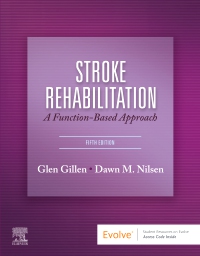
Stroke Rehabilitation Elsevier eBook on VitalSource, 5th Edition
Elsevier eBook on VitalSource

Now $99.74
Learn to confidently manage the growing number of stroke rehabilitation clients with Gillen’s Stroke Rehabilitation: A Function-Based Approach, 5th Edition. Using a holistic and multidisciplinary approach, this unique text remains the only comprehensive, evidence-based stroke rehabilitation resource for occupational therapists. This new fifth edition has been extensively updated to include the research, trends, and best practices in the field. As with previous editions, this comprehensive reference uses an application-based method that integrates background medical information, samples of functionally based evaluations, and current treatment techniques and intervention strategies.
-
- Case studies challenge you to apply rehabilitation concepts to realistic scenarios.
- Evidence-based clinical trials and outcome studies clearly outline the basis for stroke interventions.
- A survivor's perspective is included in one chapter to give you a better understanding of the stroke rehabilitation process from the client point-of-view.
- Multidisciplinary approach highlights discipline-specific distinctions in stroke rehabilitation among occupation and physical therapists, physicians, and speech-language pathologists.
- Review questions in each chapter help you assess your understanding of rehabilitation concepts.
- Key terms and chapter objectives at the beginning of each chapter help you study more efficiently.
-
- NEW! Revised and expanded content keeps you up to date on the latest information in all areas of stroke rehabilitation.
- NEW! Updated references reflect the changes that have been made in the field.
- NEW! Assessment Appendix and Pharmacological Appendix
- UPDATED! Resources for Educators and Students on Evolve
-
Part 1: Foundations of Stroke Rehabilitation
1. Pathophysiology, Medical Management and Acute Rehabilitation of Stroke Survivors
2. Improving Participation and Quality of Life through Occupation
3. Task-Oriented Approach to Stroke Rehabilitation
4. Client Centeredness: A Survivor's PerspectivePart 2: Maximizing Participation in Everyday Activities
5. Enhancing Performance of Activities of Daily Living Tasks
6. Adaptations for Managing Daily Activities with Hemiparesis
7. Functional Mobility
8. Gait Awareness
9. Work after Stroke
10. Driving and Community Mobility as an Instrumental Activity of Daily Living
11. Parenting after Stroke
12. Sexual Function and Intimacy
13. Leisure Participation after Stroke
14. Caregiving after StrokePart 3: Maximizing Outcomes for Specific Problem Areas Following Stroke
15. Psychological Aspects of Stroke Rehabilitation
16. Approaches to Motor Control Dysfunction: An Evidence-Based Review
17. Seated Postural Control: Supporting Functional Independence
18. Overview of Balance Impairments: Functional Implications
19. Vestibular Rehabilitation and Stroke
20. Upper Extremity Function and Management
21. Rehabilitation Technologies to Promote Upper Limb Recovery after Stroke
22. Edema Control
23. Orthotic Devices after Stroke
24. Managing Visual and Visuospatial Impairments to Optimize Function
25. Impact of Neurobehavioral Deficits on Activities of Daily Living
26. Treatment of Cognitive-Perceptual Deficits: A Function-Based Approach
27. Seating and Wheeled Mobility Prescription
28. Managing Speech and Language Deficits after Stroke
29. Dysphagia Management
30. Home Evaluation and ModificationsElectronic Chapters
31. A Survivor's Perspective II: StrokeAssessment Appendix
Appendix A: Job Performance Measure
Index


 as described in our
as described in our 